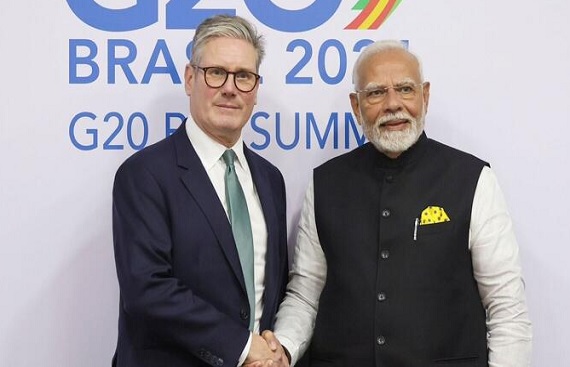India-UK Free Trade Agreement Paves the Way for Indian IT Talent and Innovation Growth
By
siliconindia | Wednesday, 07 May 2025, 11:56:33 AM IST

In a path-breaking initiative ready to transform bilateral economic ties, India and the United Kingdom have concluded a Free Trade Agreement (FTA) which holds the key to tremendous value for India's 5.4 million IT services professionals. The FTA, described as the 'most ambitious FTA commitment from the UK,', has been agreed with the intent of removing mobility constraints, encouraging the trade in digitally delivered services, and waiving double social security contributions for Indian professionals a much-persisting obstacle for Indian companies in the UK.
This change, hugely considered a turning point in India-UK relations, provides fresh opportunities for Indian IT professionals and service firms. It includes an expansive spectrum of fields such as engineering, computer and related services, and telecommunications. Business players and policymakers regard it as a game-changing move not just promoting economic cooperation but also preparing both countries for more collaboration in future-forward sectors such as artificial intelligence, cybersecurity, and fintech.
FTA will facilitate access by contractual service suppliers, business visitors, investors, intra-corporate transferees, and independent professionals to opportunities in both markets. It also grants work rights to partners and dependent children of intra-corporate transferees, thereby easing family relocation and long-term planning.
In significant relief for Indian professionals who are temporarily working in the UK, the Double Contribution Convention has been included under the agreement. This exception keeps them and their employers exempt from paying social security contributions for a period of three years. The Ministry of Commerce and Industry pointed out that this would translate into savings of around 20 percent of the salary, which would accrue to more than 60,000 employees from the IT industry alone. The overall financial gain to Indian workers and companies is going to be more than Rs 4,000 crore.
Industry association Nasscom welcomed the agreement, describing it as a symbol of the increasing economic linkages between the two nations. "This agreement will drive bilateral trade in services, promote cross-border innovation and create high-quality job opportunities for Indian talent", Nasscom said. The association also thanked the two governments for settling long-standing challenges for the Indian IT industry.
India's IT services industry has a robust presence in the UK, with Europe contributing over 25 percent of its revenues. Tata Consultancy Services (TCS) derives around 17 percent of its global revenues from the UK alone, while Infosys, HCLTech, and Wipro together generate close to 30 percent from the wider European region.
As per DD Mishra, Vice President Analyst at Gartner, the FTA is set to bring in revolutionary effects throughout the IT industry. "This increased access is expected to drive significant investments from UK firms into India's booming IT ecosystem, creating a growth and innovation-friendly environment", Mishra said. He further stated that the convergence of regulatory norms between the two nations would lower compliance expenses and facilitate easier business procedures for IT firms.
Rituparna Chakraborty, Co-founder of staffing company TeamLease Services, described the pact as a game-changer, particularly for the tech industry. "The FTA creates new opportunities for Indian IT, fintech, edtech, and professional services companies to scale up in the UK. The three-year social security exemption considerably enhances cost competitiveness," she said.
Chakraborty explained that the accord extends beyond trade facilitation; it promotes 'purposeful talent mobility' and employment generation across both nations. For British enterprises, it means simplified access to India's sizeable and well-educated talent base in fields including technology, finance, education, and design.
As the UK and India increasingly reinforce their economic partnership based on innovation, this accord is poised to open up unprecedented possibilities for professionals, investors, and businesses alike creating a new generation of cross-border cooperation, trade, and co-growth.
Read More News :
RBI's Rs 50,000 Crore OMO Auction Draws Over Rs 1.32 Lakh Crore in Bids
Rupee Opens 18 Paise Lower at 84.62/$ Amid Escalating India-Pakistan Tensions


.jpg)
